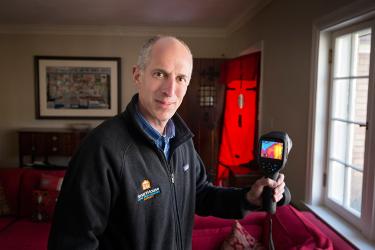SLHL: What is the most common problem in older homes in terms of energy efficiency and comfort?
Marc: Most of our clients complain about drafts, rooms that don’t heat or cool properly and cold floors. Of course, people would also like to see their energy bills go down. We are also getting a lot more calls about indoor air quality and ways to make the house more comfortable for people with allergies or chemical sensitivities.
SLHL: If I am considering renovating a space in my home, what should I consider from an energy efficiency and comfort standpoint before proceeding?
Marc: It would be really important to get a building science professional involved. Renovating your home opens up great opportunities for improving comfort and energy efficiency, but the present customer/contractor paradigm does not address that. And be wary of people that profess knowledge without the education and experience to back it up… they are often frustratingly wrong!
SLHL: What is an energy audit? When would you recommend one to a homeowner?
Marc: An energy audit is a series of inspections and tests conducted by a building science professional to identify ways of fixing comfort problems and improving energy efficiency. An energy audit can be performed at any time if improvement is your goal or done prior to a major renovation. By using tools such as thermal cameras and blower doors, an energy auditor can identify the root causes of problems and develop a cost-effective strategy to fix them.
SLHL: How can you alleviate temperature differences in your home?
Marc: Proper system design is the key. If you are building a new home, insist on a fully engineered HVAC system and a home built to ‘Energy Star’ standards. If you’d like to improve your present home, the process starts with engaging a building science professional to determine causes and develop a plan. Improvement needs to be knowledge first then products follow. If someone tries to sell you something without proper testing and/or investigation then I’d be wary.
SLHL: How can you improve indoor air quality in your existing home?
Marc: Introduce fewer pollutants and clean the air better. Many household cleaners, personal care products, air fresheners and even candles are frighteningly bad for air quality. Also, when remodeling, select paints and flooring that are low-VOC (volatile organic compounds). Beyond that, installing higher efficiency air cleaners and UV lights on your furnace can collect irritating particles and kill viruses and bacteria.
Resources
Marc Bluestone - Home performance expert, SmartHouse.





